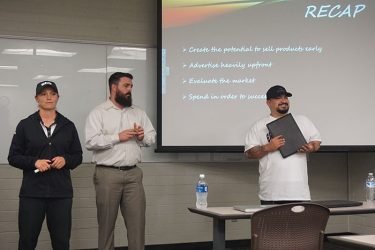By Mark Heller
GCU News Bureau
The most important business decisions often don’t involve numbers. To emphasize that, MBA students enrolled in the MKT-607 Marketing Management course at Grand Canyon University were asked to dig a little deeper into their own conscience.
An updated addition to the class’ bring-to-market computer company marketplace simulation incorporates less tangible concepts such as company culture, human resources management, employee satisfaction/retention and other potential ethical issues.

The Colangelo College of Business has used this marketplace simulation for several years, and the test-pilot addendum is a joint experiment between CCOB and Conscious Capitalism, a worldwide organization dedicated to spreading the virtues of responsible and sustainable business practices.
“GCU is absolutely leading the way in bringing these concepts to graduate and undergraduate business school students,” said Scott McIntosh, founder of the Phoenix chapter of Conscious Capitalism.
McIntosh is working with Michelle Love, assistant director of faculty training and development at GCU and instructor for the test-pilot Marketing Management class; Dr. Randy Gibb, the CCOB dean; and marketing faculty lead Chuck Jarrell to share feedback and questions before GCU decides whether to switch to the updated simulation.
During the last eight weeks, McIntosh and Gibb have sat in on a handful of Marketing Management classes that are beta-testing the updated simulation.
“The simulation program has been an awesome concept and it’s great to explore environmental issues, social issues, employees, issues that cause ripple effects on a business beyond financial bottom lines,” Love said. “It’s neat to have students work through manufacturing, labor issues, employee retention, benefits and morale issues. It’s a more holistic approach to try and appeal toward all stakeholders (of a business) that involve investors, community, happy employees and more.”
Gibb said, “We are blessed to have Scott’s involvement with our students and course. His insight regarding the integration of Conscious Capitalism principles into a successful business are so valuable for our students, taking their educational experience up another level. Michelle Love did a tremendous job teaching this course and supporting the addition of Conscious Capitalism content. Our objective is to help students understand that business is a force for good.”
Because the class is eight weeks long, the simulation is done on a tight deadline involving copious amounts of information — just like many business decisions.
“I think it’s a good addition to have because it reinforces other things like community,” said Stacia Antol, an enrollment counselor for the College of Nursing and Health Care Professions and a student in the beta-testing marketing class. “It’s not about your business alone but your business and its effect on the real world. (Results) don’t show up right away, but it makes you think above and beyond.”
McIntosh believes Conscious Capitalism takes deeper levels of thought and discourse, and the simulation updates help reinforce these concepts which are necessary for future business success.
"We should weave it into each class," he said. "Whether at a company or trying to start their own, millennials are looking for purpose and feel they can matter. Any business where you retain values and a ‘conscious’ culture, you’ll retain the best and brightest.”
Contact Mark Heller at (602) 639-7516 or [email protected]



































































